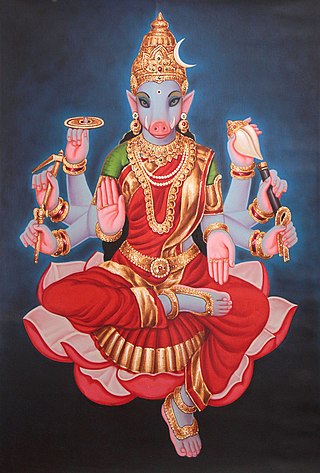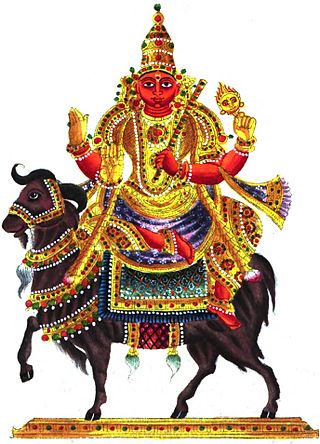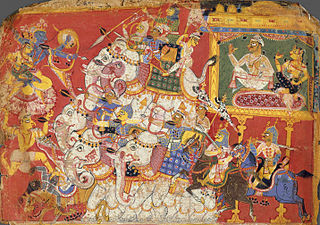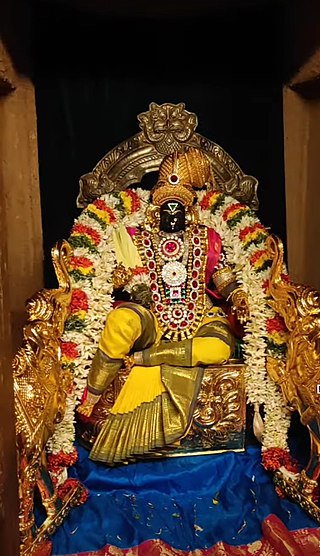
A goddess is a female deity. In many known cultures, goddesses are often linked with literal or metaphorical pregnancy or imagined feminine roles associated with how women and girls are perceived or expected to behave. This includes themes of spinning, weaving, beauty, love, sexuality, motherhood, domesticity, creativity, and fertility. Many major goddesses are also associated with magic, war, strategy, hunting, farming, wisdom, fate, earth, sky, power, laws, justice, and more. Some themes, such as discord or disease, which are considered negative within their cultural contexts also are found associated with some goddesses. There are as many differently described and understood goddesses as there are male, shapeshifting, or neuter gods.

Hindu mythology is the body of myths attributed to, and espoused by, the adherents of the Hindu religion, found in Sanskrit texts such as the Vedic literature, epics like Mahabharata and Ramayana, the Puranas, and mythological stories specific to a particular ethnolinguistic group like the Tamil Periya Puranam and Divya Prabandham, and the Mangal Kavya of Bengal. Hindu myths are also found in widely translated popular texts such as the fables of the Panchatantra and the Hitopadesha, as well as in Southeast Asian texts.
Prithvi, also rendered Pṛthvī Mātā or Pṛthivī Devī, is the Sanskrit name for the earth, as well as the name of a devi (goddess) in Hinduism and some branches of Buddhism. In the Vedas, her consort is Dyaus, the sky god. Her Puranic equivalent is known as Bhumi, the consort of Varaha.

Hiranyaksha, also known as Hiranyanetra is an asura in Hindu mythology. He is described to have submerged the earth and terrorised the three worlds. He is slain by the Varaha incarnation of Vishnu, who rescued the earth goddess Bhumi and restored order to the earth.

Mangala is the personification, as well as the name for the planet Mars, in Hindu literature. Also known as Lohita, he is the deity of anger, aggression, as well as war. According to Vaishnavism, he is the son of Bhumi, the earth goddess, and Vishnu, born when the latter raised her from the depths of the primordial waters in his Varaha avatar.

Sita also known as Siya, Janaki, Maithili, Vaidehi and Bhumija is a Hindu goddess and the female protagonist of the Hindu epic, Ramayana. She is the consort of Rama, the avatar of the god Vishnu, and is regarded as a form of Vishnu's consort, Lakshmi. She is also the chief goddess of Rama-centric Hindu traditions. Sita is known for her dedication, self-sacrifice, courage, and purity. She is one of the eighteen national heroes of Nepal.

A gramadevata is the tutelary deity of a given locality in Hinduism, primarily worshipped in the villages of India.

Naraka, also known as Narakasura, is an asura king in Hindu mythology. In Assamese tradition, he is regarded as the legendary progenitor of all three dynasties of Pragjyotisha-Kamarupa, and the founding ruler of the legendary Bhauma dynasty of Pragjyotisha. Though the myths about Naraka are first mentioned in the Mahabharata, later texts embellish them. According to later post-Vedic texts such as the Brahma Purana and Vishnu Purana, he was the son of Bhudevi, fathered either by the Varaha incarnation of Vishnu or Hiranyaksha. He is claimed as one who established Pragjyotisha. He was killed by Krishna and Satyabhama. His son Bhagadatta—of Mahabharata fame—succeeded him.

Padmavati also known as Alamelu Manga is a Hindu goddess and the consort of the deity Venkateshvara, a form of Vishnu. She is described as a daughter of a local king and an avatar of goddess Lakshmi, the consort of Vishnu.

Ganga is the personification of the river Ganges, who is worshipped by Hindus as the goddess of purification and forgiveness. Known by many names, Ganga is often depicted as a fair, beautiful woman, riding a divine crocodile-like creature called the makara. Some of the earliest mentions of Ganga are found in the Rigveda, where she is mentioned as the holiest of the rivers. Her stories mainly appear in post-Vedic texts such as the Ramayana, Mahabharata, and the Puranas.

Bhumi, also known as Bhudevi and Vasundhara, is a Hindu goddess who is the personification of the earth. She is a consort of Varaha, an avatar of the deity Vishnu. According to Vaishnava tradition, she is the second aspect of Vishnu's consort, Lakshmi, along with the aspects of Sridevi and Niladevi. According to Hindu mythology, Varaha, the third avatar of Vishnu, saved her from the asura Hiranyaksha and later married her, making her one of his consorts. She is regarded as the mother of Narakasura, Mangala, and Sita.
Ranjanka(Great King) Bhumi Chand was the founder of the Trigarta Dynasty in Satyuga. He was the first great king of the Chandravanshi group of Kshatriyas Rajputs. He is mentioned in the Puran, the holy book of Hindus, as Brahmand Puran. According to this holy book, with the blessing of Goddess Parvati, he was born in the month of April or May, the date on which 'Chetermas ki Asthami' falls.
Bumiputera or Bumiputra, which is a Malay word, comes from the Sanskrit word Bhumiputra which may be transliterated as "son of earth" or "son of the soil". It has different definitions in Brunei and Malaysia:
Prithvi is a Sanskrit word for the Earth, and also a Hindu earth goddess.
Besides eight principal queens (Ashtabharya), the Hindu god Krishna, an avatar of the god Vishnu and the king of Dvaraka, wedded a number of captured women, whose number is mentioned as 16,000 or 16,108 in different scriptures.
Dharti is a Sanskrit word meaning Earth. It may also refer to:









